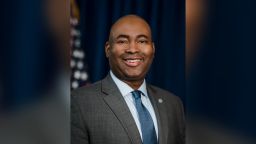Editor’s Note: Jaime Harrison is the chairman of the Democratic National Committee. He was previously a Democratic candidate for the US Senate in South Carolina. The views expressed in this commentary are his own. View more opinion on CNN.
One of the most powerful moments of my life was taking my eldest son to the polls on November 3, 2020. He got to watch me vote for myself to be a US senator – to hold a seat that Strom Thurmond, a former segregationist, clung to for almost half a century.

Though I did not ultimately win that seat, I was profoundly moved. My son is named after my grandfather, and that day, it was like my grandfather – who I once shared the tradition of voting with – was in that booth with us.
I heard his voice and felt the pain of the stories he had told me over the years. The reminder that Black men like my grandfather couldn’t always vote in South Carolina – and that even when we could on paper, voting could still cost us our lives. The image of my grandmother as a young girl, hiding with her family as the Ku Klux Klan marched down their block. The sobering truth that, for years, my grandparents and countless others were treated as less than whole people.
As I looked at my son, I also remembered my grandfather’s power – embodied in the words he said to me the last time we voted together. Diabetes had bound him to a wheelchair, but his voice was as strong and as firm as I had ever heard it: “Never let anyone tell you you don’t matter. Never let anyone tell you you don’t count.”
My grandfather knew that our right to vote was earned through struggle. On Election Day 2020, I was grateful for the sacrifices of so many that allowed me to share a beautiful moment with my son. I knew I had to keep up the fight.
My story isn’t unique. For millions of Americans like me, the right to vote isn’t just a civic responsibility, it’s a sacred act – a symbol of our hard-earned power. It is proof that our needs and the needs of our community matter. It ensures that in the halls of power our voice is heard loud and clear.
When the US Senate takes up voting rights legislation this month, that is what’s at stake. The Senate has the chance to ensure that all Americans’ votes – from elderly Black folks like my grandparents who struggled against poll taxes to communities of color traditionally overlooked or gerrymandered into irrelevance – are counted.
The Senate will always be a place of lively, principled debate about how to make our country work better for everyone. By affirming the right to vote and the sanctity of our elections, the Senate can give everyone a voice in that debate.
And the urgency of congressional action can be understated. According to the Brennan Center for Justice, as of December 2021,19 states had passed 34 laws restricting access to voting, and the assault on democracy does not stop with restricting access to the polls.
Thwarted at the national level in 2020, Republican lawmakers in several states are changing state laws to give themselves the tools to overturn the next election result they don’t like. Republicans are on the floor of the House and Senate making unhinged and deceptive efforts to cast voting rights legislation as a boogeyman because they are scared of what free and fair elections for all might mean for their political futures.
There is no denying that the threat to our democracy is one of the greatest we have ever faced. With the first primary elections of the 2022 cycle set for March, time is running out to act to protect it. The House has taken decisive action; now the Senate must follow suit.
Throughout our country’s history, Congress has acted decisively to protect and improve our democracy. After the Civil War, Congress passed the 13th, 14th and 15th Amendments to extend constitutional protections to formerly enslaved people and rebuild our nation in a way that brought us closer to our ideals. In the 1920s, Congress passed the 19th Amendment giving women the right to vote and ensuring that our democracy no longer ignored an entire sex. In the 1960s, Congress passed the 1964 Civil Rights Act and the 1965 Voting Rights Act to ensure that equality existed in practice, not just as words on a page.
In each instance, elected officials heeded the calls of the people — from icons like John Lewis and Mary Church Terrell, but also everyday folks who were sick and tired of the status quo.
Once again, those on the frontlines are ringing the alarm. Congress must listen. They must pass the Freedom to Vote Act and the John Lewis Voting Rights Advancement Act to protect our elections and secure the right to vote.
You can lend your voice to the cause. Contact your representatives, show them how much the right to vote means to you and remind them that they have an obligation to act on your behalf. Tell them loudly and proudly that you matter.
Lewis described democracy as an act. When he passed, there was bipartisan praise of his legacy. But he would not have wanted our empty words. He would have wanted action. And those of us who fail to meet this moment should think twice before invoking the name of Lewis or any other heroes who dedicated their lives to free the vote.
President Joe Biden and Vice President Kamala Harris understand this.
Their commitment to voting rights remains unshakeable. Sadly, most of the Republican Party has abandoned its support for voting rights, but the Democratic Party, a principled Republican and the majority of the nation are steadfast. It is time now for all of us to come together and translate that commitment into law.
We can’t nibble around the edges. It is time to ensure that my children, and all our children, never have to know the burdens my grandparents faced.



